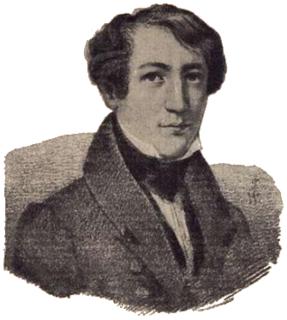| Look up Dunker or dunker in Wiktionary, the free dictionary. |
A Dunker is a breed of dog, also known as the Norwegian Hound.
Contents
Dunker or Dunkers may also refer to:
| Look up Dunker or dunker in Wiktionary, the free dictionary. |
A Dunker is a breed of dog, also known as the Norwegian Hound.
Dunker or Dunkers may also refer to:
Heine is both a surname and a given name of German origin. People with that name include:
Events from the year 1787 in art.
Andreas is a name usually given to males in Austria, Greece, Cyprus, Denmark, Armenia, Estonia, Ethiopia, Eritrea, Finland, Flanders, Germany, Norway, Sweden, Switzerland, Romania, the Netherlands, and Indonesia. The name derives from the Greek noun ἀνήρ anēr, with genitive ἀνδρός andros, which means "man". See the article on Andrew for more information. The Scandinavian name is earliest attested as antreos in a runestone from the 12th century.

Gustav, also spelled Gustaf, is a male given name of likely Old Swedish origin, used mainly in Scandinavian countries, German-speaking countries, and the Low Countries, possibly meaning "staff of the Geats or Goths or gods", possibly derived from the Old Norse elements Gautr ("Geats"), Gutar/Gotar ("Goths") or goð ōs ("gods"), and stafr ("staff"). Another etymology speculates that the name may be of Medieval Slavic origin, from the name Gostislav, a compound word for "glorious guest", from the Medieval Slavic words gosti ("guest") and slava ("glory") and was adopted by migrating groups north and west into Germany and Scandinavia. This name has been borne by eight Kings of Sweden, including the 16th-century Gustav Vasa and the current king, Carl XVI Gustaf. It is a common name for Swedish monarchs since the reign of Gustav Vasa. The name has entered other languages as well. In French it is Gustave; in Italian, Portuguese and Spanish it is Gustavo. The Latinised form is Gustavus. A side form of the name in Swedish is Gösta. The name in Finnish is Kustaa, while in Icelandic it is written Gústav or Gústaf.
Events in the year 1807 in art.
Events from the year 1731 in art.
Events from the year 1745 in art.
Henrik is a male given name of Germanic origin, primarily used in Scandinavia, Estonia, Hungary and Slovenia. In Poland, the name is spelt Henryk but pronounced similarly. Equivalents in other languages are Henry (English), Heiki (Estonian), Heikki (Finnish), Henryk (Polish), Hendrik (Dutch), Heinrich (German), Enrico (Italian), Henri (French), Enrique (Spanish) and Henrique (Portuguese). It means 'Ruler of the home' or 'Lord of the house'.
Loos is a Dutch and Low German surname. It can be of toponymic, patronymic or descriptive origin. In the Low Countries, Lo/Loos was a short form of Lodewijk while in North Germany the name may be derived from Nikolaus. People with this surname include:

The Alter Südfriedhof also known as "Alter Südlicher Friedhof" is a cemetery in Munich, Germany. It was founded by Duke Albrecht V as a plague cemetery in 1563 about half a kilometer south of the Sendlinger Gate between Thalkirchner and Pestalozzistraße.

Hjalmar Eilif Emanuel Peterssen was a Norwegian painter. He is most commonly associated with his landscapes and portraits.
Meijer is a Dutch surname. It refers to a profession similar to a bailiff or steward. It originates from the Latin word maior and is often rendered Meyer abroad.
Bernt is a Scandinavian variant of the German masculine given name Berend which is the Low German form of Bernard (Bernhard). The name Bernhard means "Strong bear". Its use in Sweden was first documented in 1395.

Balthasar Anton Dunker was a German landscape painter and etcher.
Antonie is a given name with several origins and uses.

Bernhard Dunker was a Norwegian jurist, barrister and Attorney General of Norway.
Duncker is a surname. Notable people with the surname include:
Anthon is a Danish, Finnish, German, Norwegian and Swedish masculine given name that is used in Greenland, Finland, Norway, Sweden, Republic of Karelia, Estonia, Namibia, Denmark, Germany, Switzerland and Austria. Notable people with this name include the following:
Carl Otto is a blended given name. Notable people known by this name include the following: